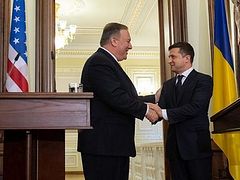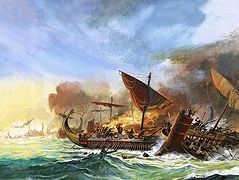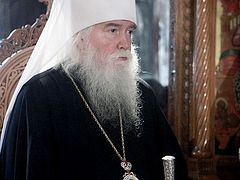After Vladimir Zelensky’s victory in the presidential elections in Ukraine, a relative peace reigned; against the background of his predecessor Petro Poroshenko, the actor and comedian looked like a nice guy. That was in fact part of his politics—non-interference in Church matters. And beginning in the summer of 2019, a time of calm came for the Ukrainian Orthodox Church; if their churches were seized here or there, it was on a select basis. The anti-Church laws were set aside on a far shelf.
It seemed that a normal person had finally come to power in Kiev.
However, recent events, primarily in the political scene, speak to the fact that the period of calm is ending. And so it would make sense to present a chronology of events in the area of politics.
On the whole, Zelensky came to power on his moderate rhetoric and promises to stop the conflict in the Donbass. Nevertheless, the conflict is not over, it is only frozen, and the negotiation process has been put on hold. Meanwhile, relations with Russia have begun to erode even further.
Against this background, the “Soroslings”1 have actively begun to put pressure on Zelensky. These are the stooges of Western structures that are now occupying a large number of key posts in the Ukrainian government. The vice chairman of the President’s office, Kirill Timoshenko, is called a “Sorosling”.
And so, from early September [2020] events have speded up sharply. At the beginning of September, NATO war planes fly over Ukraine not far from its border with Crimea. This was a symbolic step within the framework of the USA’s “show of muscle” before Russia. In Moscow it was announced that this was a missile strike drill, and objections were expressed.
On October 6–7, Zelensky makes a visit to London and meets there with the head of the intelligence service M16, former ambassador of Great Britain to Turkey Richard Moore. After the meeting, the Ukrainian leader announces the creation of two military bases in Ukraine.
On October 16, Zelensky meets with Turkish president Recep Erdogan, after which an announcement appears about creating a certain “Crimean platform”, which is supposed to facilitate the return of the Crimea to Ukraine. Besides that, an announcement appears about Ukraine’s willingness to work with Turkey in producing military strike drones.
On October 25, during elections in Ukraine, Zelensky conducts a parallel survey containing the question: “Should Ukraine raise the question on the international level of making use of the security guarantees determined in the Budapest memorandum?” The Budapest memorandum, according to which Kiev renounced its own use of nuclear weapons whereas all the other countries were to be the guarantors of its security, was signed in 1994 between the leaders of Ukraine, Russia, USA, and Great Britain. The memorandum is periodically used by the Ukrainian “war party” in order to activate the idea of Western support.
Later, when a journalist asked Zelensky why Ukrainians were surveyed about the memorandum, Zelensky' answer was intriguing: “I really need that opinion. What I’ll do beyond that I won’t say, because this is complex work that I’m engaged in. I am working on reviving a militarily competent Ukraine.”
In the final analysis, according to information from representatives of the Presidential faction, the majority of Ukrainians answered “yes” to this very convoluted issue in the memorandum. It could potentially provide an opportunity to address the USA or Great Britain with requests to provide military security to Ukraine, which considers Russia an aggressor state.
All these actions speak to an increase in military and anti-Russian mood in Ukraine. One would think, what does the Church have to do with it? However, if we look more closely, we can trace renewed attention to Church matters in all of these actions.
First of all, we are talking about Zelensky’s meeting with Constantinople Patriarch Bartholomew. This is now the second meeting. We wrote about the first one earlier, wihch was quite a cool meeting. But the second meeting, which took place before the meeting with Erdogan, was much warmer. Zelensky thanked Bartholomew for his “personal support in the sovereignty and territorial integrity of Ukraine” and invited him to Kiev in 2021, around Independence day, August 24.
Many experts in Russia interpreted this as a pre-election move; however, certain things point to the fact that that’s not the case.
On September 13, US Secretary of State Mike Pompeo visits Cyprus, and at the same time arrives Patriarch Theodoros of Alexandria—the head of a Church that has recognized the Ukrainian “OCU” [Orthodox Church of Ukraine, the structure non-canonically formed by Pat. Bartholomew out of two schismatic groups.—OC.]. Meetings go on between secular authorities and metropolitans, and a certain “center for the defense of the island’s borders” is announced in Larnaka. The reason for Theodoros’s visit is not completely understood. And on October 24, Archbishop Chrysostomos of Cyprus commemorates the head of the “OCU” Epiphany Dumenko. The Orthodox author Alexander Voznesensky wrote about this.
On September 30, the US Secretary of State says at a meeting with Prime Minister Kiriakos Mitsotakis:
The prime minister and I have agreed to discuss means of closer cooperation in order to overcome the challenges created by Russia through its activities that have a harmful effect—such as spreading disinformation on the pandemic and attempts to take over the Orthodox Church.
From these actions it is clear that the USA, despite its own internal political problems, has not abandoned its support for the schismatic “OCU” project. And judging from all this, it will continue its support one way or another.
On September 23 a legislative bill appeared in the Ukrainian parliament on military chaplain services, which specifies that candidates for chaplains be approved by the Ukrainian Military Service and military counterintelligence. And this despite the fact that in the Ukrainian military there is only one chaplain from the canonical UOC, while all the rest are either from the “OCU”, the Uniates, or other confessions.
On September 30, the ex-chairman of the Department of Religious Affairs and Nationalities Andrei Yurash, a fierce enemy of the Church, announced the creation of a Department of Religious Affairs in the Secretariate of the Cabinet of Ministers. According to information from the Union of Orthodox Journalists, Yurash was aided in the creation of this structure by Cabinet Minister Oleg Nemchinov, who is close to Prime Minister Denis Shmygalo. Earlier Nemchinov, as an member of the Ministry of Youth and Sport, participated in events conducted by Uniates in Lvov.
Thus, all of the above points to the fact that Ukraine is gradually rolling back to the same Russophobic politics it had under Poroshenko. And in this situation the Ukrainian Orthodox Church will play the role of one of the “enemy’s” faces—an internal enemy upon which it is easiest to pour out all their rage; and by passing anti-Church laws for the confiscation of churches from the faithful, it is easy for the Russophobic portion of society to create an illusion of victory.
Even the front deputies from the presidential faction “People’s Servant” have taken note of this tendency. For example, Deputy of Parliament from the ruling party Maxim Buzhansky noted on his Telegram channel:
Just a little further in this vein, and if you compare the texts of declarations by officials in 2020 with those of 2017, it will be impossible to find any difference between them. I remind you that this tendency decisively turned away the electorate a year ago. We don’t need to explain everything by the enemies’ machinations, thereby hiding the machinations of our friends; we’ve already been through that.
That is how he responded to the declaration made by the head of the Council of National Security and Arms Alexei Danilov, who accused the judges of the Constitutional Court of working for the Kremlin.
It also must be remembered that pressure on the Local Churches from the USA in the matter of recognizing the “OCU” has not ended. No, it’s not going so quickly, but it will still go on, regardless of who heads the White House next.
The Telegram channel “Labarum” spoke about how the next candidate for pressure from the USA to recognize the “OCU” will be the Jerusalem Church:
The Jerusalem Patriarchate is dependent on the Israeli government in certain property and administrative matters. As we understand, Israel is extremely dependent upon the USA today. This is truer under Trump than it was under Obama. And through the Israeli government, the Americans are pressuring Patriarch Theophilos. There is likewise pressure through the governments of Palestine and Jordan, because there is also the factor of dependence on American financial aid.
To Patriarch Theophilos’ honor, it is worth saying that he has held out courageously all this time and hasn’t given up his position. But there is a problem: Although it doesn’t recognize the schismatics and does not give them access to the Sacraments in the Holy Land, and it organized the Aman Assembly, the Jerusalem Patriarchate has nevertheless not officially rejected the “OCU”.
But we would like to wish the Ukrainian Orthodox Church, and first of all its primate Metropolitan Onuphry, God’s blessing and strength of spirit; after all, to be the head of a persecuted Church is a great spiritual podvig. And it is the Christians of the persecuted Church who show us the true podvig of strength of spirit and faithfulness to Christ.





